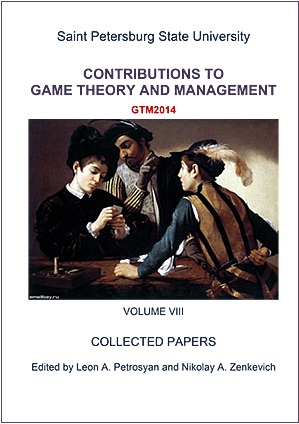Analysis in Social Networks with Usage of Modified Raiffa Solution for Cooperative Games
Abstract
We present our approach based on Nash bargaining problem for
n-player definition as a set B settled pairs (S, d). The
elements B of are called instance (examples) of the problem B,
elements S are called variants or vector of utility, point d is
called the point of disagreement, or status quo. From the point of
view that we develop it is interesting Raiffa's solution that was
proposed in the early 1950's. Raiffa (1957) suggested dynamic
procedures for the cooperative bargaining in which the set S of
possible alternatives is kept unchanged while the disagreement point d gradually changes. He considers two variants of such process --
a discrete one and the continuous one. Discrete Raiffa's solution is
the limit of so called dictated revenues. Diskin, A., Koppel, M.,
Samet D. (2011) have provided an axiomatization of a family of
generalized Raiffa's discrete solutions. The solution concept which
is composed of two solution functions. One solution function
specifies an interim agreement and the other specifies the terminal
agreement. The solution that we suggest and that we called von
Neumann-Morgenstern modified discrete Raiffa's solution for n = 3.
Our approach modifies Raiffa solution as a value of compensation,
that implies from affinity of the player Xr to the player Xs based
on the assumption that they will be in the same (n-1) members of
coalition.
Comparing the results of the original game with the game extended of
player affinities brings valuable results if analysing various types
of social networks. Particularly when examining relations based on
investing in social status and when analysing the structures based
on mutual covering of violations of the generally accepted
principles.
Keywords:
Nash bargaining problem for n-player, Raiffa solution, three-person game, social network, coalition affinity, social networks based on mutual covering violate the generally accepted principles, von Neumann-Morgernstern stable set
Downloads
References
Downloads
Published
How to Cite
Issue
Section
License
Articles of "Contributions to Game Theory and Management" are open access distributed under the terms of the License Agreement with Saint Petersburg State University, which permits to the authors unrestricted distribution and self-archiving free of charge.




